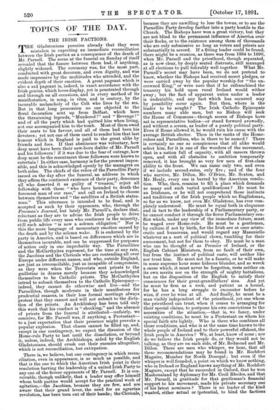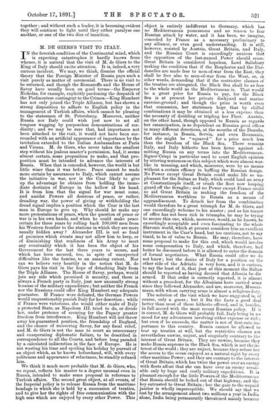TOPICS OF THE DAY.
THE IRISH FACTIONS. THE Gladstonians perceive already that they were mistaken in expecting an immediate reconciliation between the Irish parties as a consequence of the death of Mr. Parnell. The scene at the funeral on Sunday of itself revealed that the fissure between them had, if anything, slightly widened. The ceremony was, for the most part, conducted with great decorum, and even dignity, and was made impressive by the multitudes who attended, and the evident depth of their emotion. A great pageant which is also a sad pageant is, indeed, in exact accordance with the Irish genius, which loves display, yet is penetrated through and through on all occasions, and in every method of its manifestation, in song, in rites, and in oratory, by the incurable melancholy of the Celt who lives by the sea. But in that _long procession no one objected to the floral decoration sent up from Belfast, which bore the threatening legends, " Murdered !" and " Revenge !" and of all the party which had quitted him when living, not one accompanied him to the tomb. Most of them owed their seats to his favour, and all of them had been his devotees ; yet not one of them cared to render him that last honour which in England is paid to the great alike by friends and foes. If that abstinence was voluntary, how deep must have been their new-born dislike of Mr. Parnell and his followers ! if it was due to the fear of outrage, how deep must be the resentment those followers were known to entertain ! In either case, harmony is for the present impos- sible, and this is acknowledged openly by the managers on both sides. The chiefs of the relics of the Parnellite Party issued on the day after the funeral, an address in which they affirm the continued existence of their party, denounce all who deserted it as guilty of " treason," reject all fellowship with those " who have hounded to death the foremost man of our race," and call on Ireland to choose between themselves and " the satellites of a British states- man." This utterance is intended to be final, and is accepted as such by their opponents, who, through the Freeman's Journal, but lately Mr. Parnell's, declare that, reluctant as they are to advise the Irish people to drive from public life every man who continues in the minority, still such advice " is now a solemn obligation." Nor is this the mere language of momentary emotion caused by the death and by the solemn wake. It is endorsed by the party in America, and is based on differences which are in themselves incurable, and can be suppressed for purposes of action only in one improbable way. The Parnellites and the McCarthyites represent, for the time at any rate, the Jacobins and the Clericals who are contending all over Europe under different names, and who, outside England, are just as irreconcilable, just as incapable of compromise, as they were when the Terrorists sent priests to the guillotine in dozens merely because they acknowledged themselves to be Catholic priests. The McCarthyites intend to submit themselves to the Catholic Episcopacy— indeed, they cannot do otherwise and live—and the Parnellites, though moderate in their manifestoes for prudential reasons, in their less formal meetings always protest that they cannot and will not submit to the dicta- tion of the priests. An Archbishop has been told only this week that his conduct is " shocking," and the absence of priests from the funeral is attributed—unfairly, we conceive, for Mr. Parnell was, if anything, a Protestant— to a just expectation that their presence might provoke a popular explosion. That chasm cannot be filled up, and, except in one contingency, we expect the disunion of the Home-rule Party to last until the dissolution, or beyond it, unless, indeed, the Archbishops, aided by the English Gladstonians, should crush out their enemies altogether, which is not reconciliation, but extirpation.
There is, we believe, but one contingency in which recon- ciliation, even in appearance, is so much as possible, and that is the one to which the American Irish point in their resolution barring the leadership of a united Irish Party to any one of the fiercer opponents of Mr. Parnell. It is con- ceivable, though unlikely, that a leader may offer himself whom both parties would accept for the practical work of agitation,—the Jacobins, because they are few, and are aware that their grand lever, the need for an agrarian revolution, has been torn out of their hands; the Clericals, because they are unwilling to lose the towns, or to see the Parnellite Party develop farther into a party hostile to the Church. The Bishops have won a great victory, but they are not blind to the permanent influence of America over their flocks, or to the existence among them of thousands who are only submissive so long as voters and priests are substantially in accord. If a fitting leader could be found, there might be a reunion, as there was from 1884 to 1890, when Mr. Parnell and the priesthood, though separated, as is now clear, by deeply seated. distrusts, still managed at all elections to pull tolerably well together. What Mr. Parnell's secret may have been, we do not pretend to. know, whether the Bishops had received secret pledges, or were carried away by the popular worship for "the un- crowned King," or were sure that if he enfranchised the tenantry his hold upon rural Ireland would wither away ; but the fact of apparent union under a leader is undeniable, and any fact which has occurred. may by possibility occur again. But then, where is the leader to be sought ? The Irish Catholic Episcopate numbers many able men, but no Bishop will seek the House of Commons—though scores of Bishops have sat in representative bodies—or stand forward avowedly, and without a screen, as leader of a purely political party. Even if Rome allowed it, he would ruin his cause with the average British elector. Then in the ranks of the Home- rulers and Parnellites, who is there to be named ? There is certainly no one so conspicuous that all alike would select him, for it is one of the wonders of the movement, that in a nation full of capacity, with all careers thrown open, and with all obstacles to ambition temporarily removed, it has brought so very few men of first-class ability to the front. We can name only two, and even if we include second-rates, only five ; and of the four who survive, Mr. Dillon, Mr. O'Brien, Mr. Sexton, and Mr. Healy, every one is barred by the American resolu- tion. Who, then, remains to fill a place which demands so many and such varied qualifications ? He must be an Irishman, or he will not comprehend those instincts and traditions of the Irish people which no Englishman. so far as we know, not even Mr. Gladstone, has ever com- pletely understood. He must be equal both in eloquence and in tact to the leadership of a Parliamentary party, or he cannot conduct it through the fierce Parliamentary con- flict which, under any view of the immediate future, must be waged over Home-rule. He must be a gentleman, by culture if not by birth, for the Irish are at once aristo- cratic and humorous, and would regard any Masaniello• whatever as a sort of political clown, tumbling for their amusement, but not for them to obey. He must be a man who can be thought of as Premier of Ireland, or the English Cabinet Ministers, from no fault of their own,. but from the instinct of political caste, will neither like nor trust him. He must not be a fanatic, or he will make in some supreme hour some hideous blunder, and so wreck a cause which, it must never be forgotten, rests neither on its own merits nor on the strength of mighty battalions, but on the disposition of the English to satisfy their consciences for their great-grandfathers' sins. And yet he must be firm as a rock, and patient as a hound, for he has a long struggle to encounter before he wins, if ever he wins at all. And finally, he must be a man visibly independent of the priesthood, yet one whom the priesthood can trust, when it comes to arranging for their special claims, to postpone his own convictions to the necessities of the situation,—that is, we fancy, under existing conditions, he must be a Protestant on whom his special faith sits lightly. Who is there who combines all those conditions, and who is at the same time known to the whole people of Ireland and to their powerful offshoot, the Irish people in America ? We, at least, know of none ; nor do we believe the Irish people do, or they would not be talking, as they are on each side, of Mr. Redmond and Mr. Dillon. There are men who whisper, we hear, that all these recommendations may be found in Mr. Rochfort Maguire, Member for North Donegal ; but even if the whisper is well founded, a point on which we know nothing, who in Ireland or England knows anything of Mr. Rochfort Maguire, except that he succeeded in Oxford, that he won Mashonaland by diplomacy for Mr. Cecil Rhodes, and that Mr. Parnell, in gratitude for that gentleman's financial support to his movement, made his private secretary one of his latest nominees ? There is no leader of the kind. wanted, either actual or /potential, to bind the factions together ; and without such a leader, it is becoming evident they will continue to fight until they either paralyse one another, or one of the two dies of inanition.



































 Previous page
Previous page